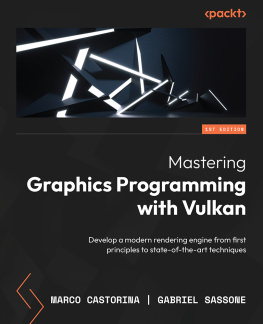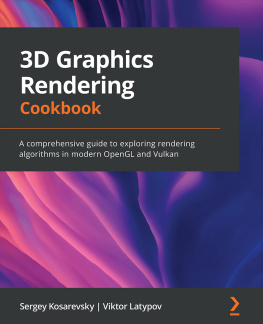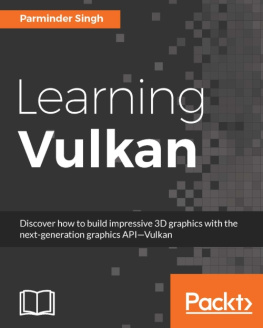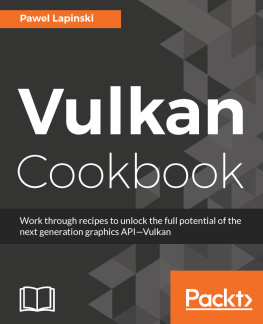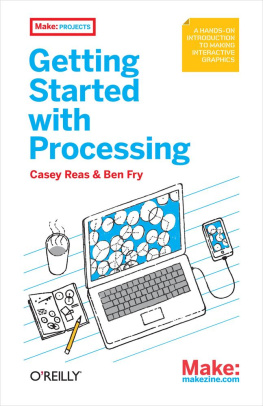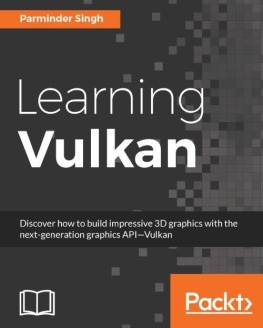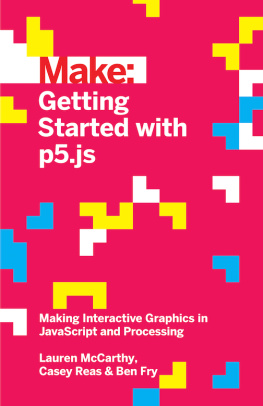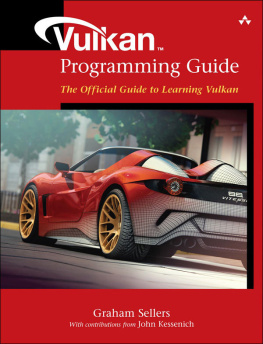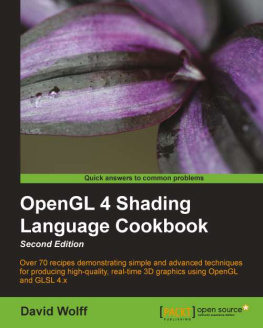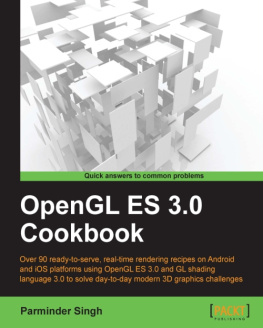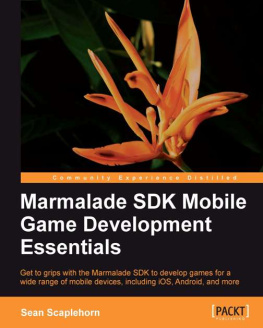Pawel Lapinski - Vulkan Cookbook
Here you can read online Pawel Lapinski - Vulkan Cookbook full text of the book (entire story) in english for free. Download pdf and epub, get meaning, cover and reviews about this ebook. year: 2017, publisher: Packt Publishing, genre: Computer. Description of the work, (preface) as well as reviews are available. Best literature library LitArk.com created for fans of good reading and offers a wide selection of genres:
Romance novel
Science fiction
Adventure
Detective
Science
History
Home and family
Prose
Art
Politics
Computer
Non-fiction
Religion
Business
Children
Humor
Choose a favorite category and find really read worthwhile books. Enjoy immersion in the world of imagination, feel the emotions of the characters or learn something new for yourself, make an fascinating discovery.

- Book:Vulkan Cookbook
- Author:
- Publisher:Packt Publishing
- Genre:
- Year:2017
- Rating:4 / 5
- Favourites:Add to favourites
- Your mark:
Vulkan Cookbook: summary, description and annotation
We offer to read an annotation, description, summary or preface (depends on what the author of the book "Vulkan Cookbook" wrote himself). If you haven't found the necessary information about the book — write in the comments, we will try to find it.
Work through recipes to unlock the full potential of the next generation graphics APIVulkan
About This Book- * This book explores a wide range of modern graphics programming techniques and GPU compute methods to make the best use of the Vulkan API.
- * Teaches techniques that can be applied to a wide range of platforms desktop, smartphones, and embedded devices.
- * Presents exciting imaging processing and post-processing techniques.
This book is ideal for developers who know C/C++ languages, have some basic familiarity with graphics programming, and now want to take advantage of the new Vulkan API in the process of building next generation computer graphics. Some basic familiarity of Vulkan would be useful to follow the recipes. OpenGL developers who want to take advantage of the Vulkan API will also find this book useful.
What You Will Learn- * Work with Swapchain to present images on screen
- * Create, submit, and synchronize operations processed by the hardware
- * Create buffers and images, manage their memory, and upload data to them from CPU
- * Explore descriptor sets and set up an interface between application and shaders
- * Organize drawing operations into a set of render passes and subpasses
- * Prepare graphics pipelines to draw 3D scenes and compute pipelines to perform mathematical calculations
- * Implement geometry projection and tessellation, texturing, lighting, and post-processing techniques
- * Write shaders in GLSL and convert them into SPIR-V assemblies
- * Find out about and implement a collection of popular, advanced rendering techniques found in games and benchmarks
Vulkan is the next generation graphics API released by the Khronos group. It is expected to be the successor to OpenGL and OpenGL ES, which it shares some similarities with such as its cross-platform capabilities, programmed pipeline stages, or nomenclature. Vulkan is a low-level API that gives developers much more control over the hardware, but also adds new responsibilities such as explicit memory and resources management. With it, though, Vulkan is expected to be much faster.
This book is your guide to understanding Vulkan through a series of recipes. We start off by teaching you how to create instances in Vulkan and choose the device on which operations will be performed. You will then explore more complex topics such as command buffers, resources and memory management, pipelines, GLSL shaders, render passes, and more. Gradually, the book moves on to teach you advanced rendering techniques, how to draw 3D scenes, and how to improve the performance of your applications.
By the end of the book, you will be familiar with the latest advanced techniques implemented with the Vulkan API, which can be used on a wide range of platforms.
Style and approachThis recipe-based guide will empower you to implement modern graphic programming techniques and help gain a solid understanding of the new Vulkan API.
Pawel Lapinski: author's other books
Who wrote Vulkan Cookbook? Find out the surname, the name of the author of the book and a list of all author's works by series.

